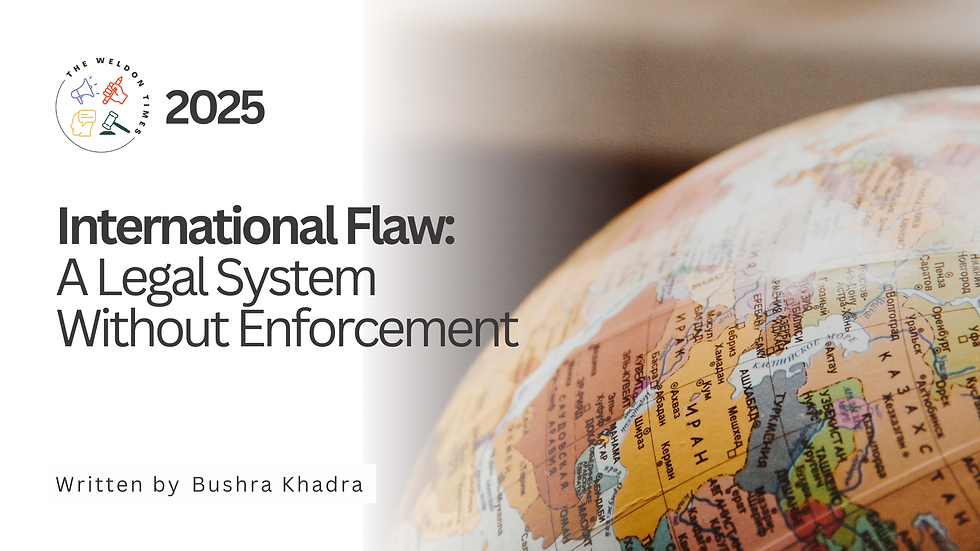International Flaw: A Legal System Without Enforcement
- Bushra Khadra
- Feb 27, 2025
- 3 min read

Studying international law as a law student feels like playing a game of Uno where everyone insists on their own rules. It relies on diplomatic pressure and the hope that states will act in the global interest, yet time and time again, we watch it falter, often live streamed to our phones.
The disconnect between what we learn in class and how international law functions makes disillusionment inevitable. If no one disciplines violations and political interests dictate compliance, what is the value of international law? How can a law student reconcile these frustrations while engaging with the field? This article explores these questions through conversations with professors who specialize in international law, offering their perspectives.
What is international law?
This question lies at the core of how international law is understood and applied. Professor Liam McHugh-Russell sees law as a toolkit of political ideals, normative frameworks, and discourse rather than an independent force. He believes the expectation that law will deliver clear moral outcomes is misguided, especially internationally, where enforcement is selectively applied. Further, Professor Lantz points out that nations frequently justify their breaches by using strained interpretations of the law to appear compliant. However, this contradicts several fundamental principles of the law, such as rule of law and good faith treaty interpretations. When states manipulate legal language to excuse violations, it chips away at the stability and effectiveness of international law.
What is the purpose of international law?
Professor Chircop explains that the effectiveness of international law depends on one’s perspective about its purpose. He says it first emerged as a system of coexistence before shifting to one of cooperation, and its ability to sustain that shift remains uncertain. Some areas remain strong, while others are under stress. The current challenge is determining which weaknesses are temporary and which indicate deeper structural issues. If nations are meant to better cooperate through international law, then it needs teeth.
How do we bolster international law’s power?
The sharpness of international law’s teeth depends on several factors, from enforcement regimens to domestic compliance. On the latter, Professor Seck says part of the challenge of international law lies in how it is perceived, particularly in North America. Despite its crucial role worldwide, it remains underappreciated in Canadian legal education and practice. In contrast, other regions deeply embed international law into legal training, policy discussions, and domestic legal processes. If Canadian law students and lawyers better understood how to recognize and apply international principles and treaties within our domestic frameworks, they would be better equipped to craft laws aimed at local and global justice.
Even now, there are simple ways for law students and other legal professionals to support international law. Professor Herencia Carrasco of the University of Ottawa reinforces the importance of staying engaged, emphasizing that those who undermine international law rely on skepticism and disillusion to weaken its influence. Carrasco encourages continued study of the global system because, even if it takes time,accountability will come.
The rule of law exists only where people uphold it. The more it is dismissed by governments — and law students —, the weaker it becomes. International law may not be a grand unified system. It may instead be a fragile network shaped by shifting global politics. If we believe in its purposes, we need to question its strengths and weaknesses and think critically of it; we must meaningfully engage.






Comments